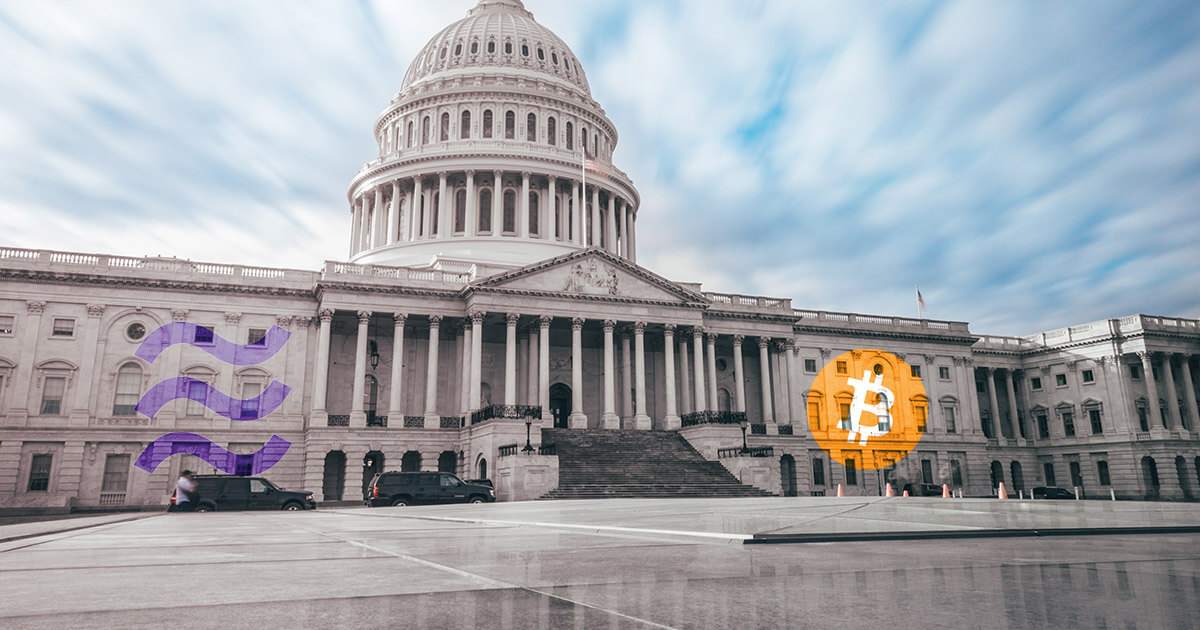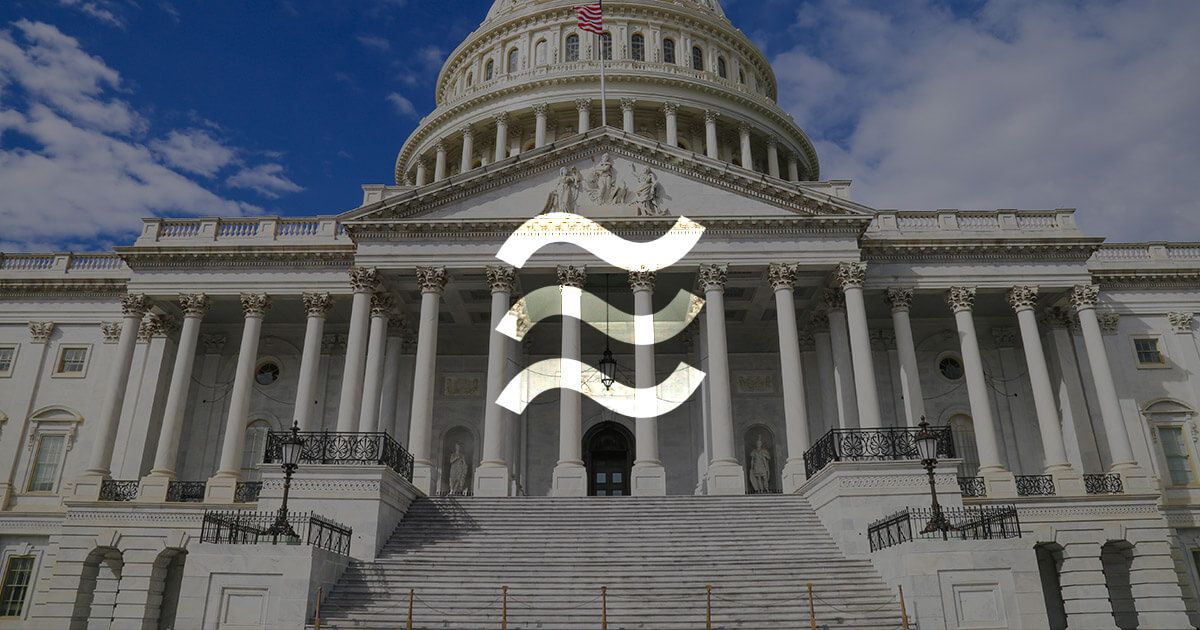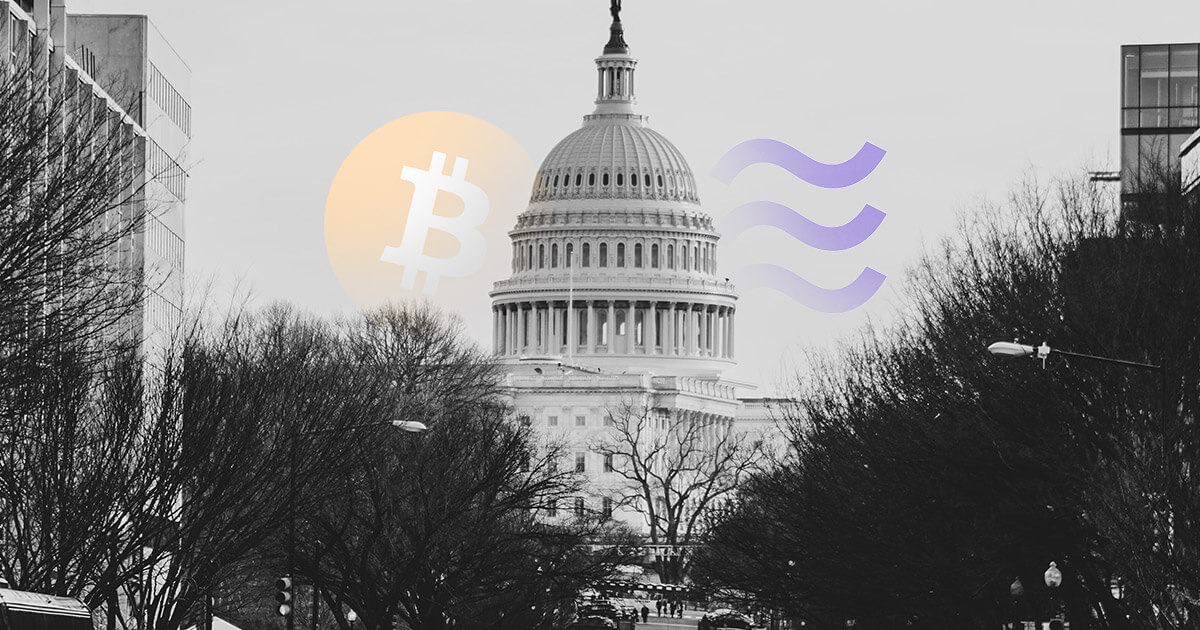In a historic moment in Congress, pro-cryptocurrency representatives warned the House of Representatives of the “unstoppable” power of Bitcoin, calling for the United States to clarify regulations and seize the lead in blockchain innovation. Meanwhile, Facebook’s Libra continued to face relentless opposition.
David Marcus made his second appearance on Capitol Hill this week to testify before the House Financial Services Committee. In the hearing titled “examining Facebook’s proposed cryptocurrency and its impact on consumers, investors, and the American financial system,” Marcus attempts to make progress towards gaining regulatory approval for the Libra cryptocurrency.
Primer on Libra
Libra is Facebook’s proposed stablecoin backed by a basket of low-yield assets. Calibra, a subsidiary of Facebook, is one of many wallet applications that will allegedly exist on the Libra network. The application, similar to Venmo or PayPal, will utilize the cryptocurrency to settle payments while offering consumers fraud protection while serving as a gateway for conducting know-your-customer and anti-money laundering checks on users.
According to the Libra whitepaper and testimony from Marcus, Libra will eventually be lead by a non-profit association of over one hundred member companies based out of Geneva, Switzerland. Some current members include Mastercard, Visa, Coinbase, and Uber.
Congress hostile toward Facebook’s Libra
As demonstrated in the previous hearing with the Senate Committee, U.S. policymakers have little trust in the social media giant.
“Facebook is apparently trying to create a new global financial system that is intended to rival the U.S. dollar,” opened chairwoman Maxine Waters, a California Democrat. “This venture is slated to be based in Switzerland that has a history as a monetary haven for criminals and shady corporations.”
Yet, as Marcus previously emphasized in front of the Senate, if the government does not act, then unregulated systems like Bitcoin, or the cryptocurrency China is exploring, could jeopardize the financial stability of the U.S. financial system.
However, given Facebook’s track record of violating the public’s trust and abusing users, Rep. Waters and many others in Congress are skeptical.
“Facebook’s proposed entry into financial services is all the more troubling because it has already harmed vast numbers of people on a scale similar to Wells Fargo and demonstrated a pattern of failing to keep consumer data private on a scale similar to Equifax.”
Rep. Waters goes on to say, conclusively:
“Ultimately, if Facebook’s plans come to fruition the company and its partners will wield immense economic power that could destabilize currencies and governments.”
The negative sentiment toward Facebook culminated in legislation. The “Keep Big Tech Out of Finance Act,” a bill obviously pointed at barring the social media giant from creating its own cryptocurrency, is making its way through Congress.
Trust is in short supply for Facebook
One member of the expert panel brought before Congress, Gary Gensler—former co-head of finance at Goldman Sachs and the 11th chairperson of the Commodity Futures Trading Commission—was somewhat puzzled by Facebook’s push into payments.
“All of finance has one foundation. And it’s trust. For some unexplained reason, Facebook has chosen to make these bold proposals when trust is not in good supply.”
Gensler goes on to provide a myriad of examples for how trust in corporations have resulted in disaster.
Enron wanted trust to set-up sophisticated, international energy trading. Instead, the company used that trust to distort its accounting practices and manipulate markets, resulting in a bankruptcy that shook the American stock markets and took down the world’s fifth-largest accounting firm, Arthur Anderson.
Long-Term Capital Management was a hedge fund that used new algorithmic trading techniques in the derivatives market, initially to great success. Later, the 1997 financial crisis in Asia and the 1998 Russian financial crisis caused the fund to lose $4.6 billion in four months. As a result, 14 of the world’s largest financial institutions once again needed, and received, a $3.6 billion bailout.
The final trust-based scandal Gensler presents is the “Libor” scandal, a failure in the London Interbank Offered Rate. The rate was calculated using average interest rates submitted voluntarily by banks across the globe. In 2012, banks were discovered colluding to manipulate these rates for trading profits or to inflate their creditworthiness. Trillions of dollars in home mortgages and consumer loans were harmed by these manipulated rates.
The point Gensler was this: when corporations demand trust Americans are hurt. And, the executives of these financial institutions are seldom held accountable while everyday taxpayers pay for these bailouts.
International dominance of the U.S. dollar
As posed by the Senate and implied by statements from the U.S. Treasury, Bitcoin and Libra both threaten the monetary system that the United States leverages to exert influence globally. Al Green, a Democratic Representative for Texas, makes a statement that embodies both the power and concern for the USD:
“I’m concerned about the dollar. As you know there is a competition for currency supremacy. The dollar is the preferred currency in the world. The Yen competes. The Euro competes. And there are others.”
…
“How will this impact the dollar? This is our currency. The dollar is the means by which we have the opportunity to influence the economic order in the world,” Green said emphatically. “How will this impact the dollar?”
In contrast to the concerns raised by Green and the Treasury, Rep. Emmer is instead concerned about the role the dollar plays in facilitating illicit activity::
“My colleagues are incredibly fearful of the money laundering and criminal activity in cryptocurrencies, but the dollar and all fiat backed-currencies have been proven to be the largest means of illicit behavior and money laundering.”
Bitcoin is here to disrupt the system
In a historic display before Congress, a handful of different representatives defended and advocated for Bitcoin. Patrick McHenry, North Carolina’s Republican representative, was one of those main advocates.
“Change is here. Blockchain technology is real. And Facebook’s entry into this new world is just confirmation.”
McHenry recognized the decentralized and permissionless movement spurred by Bitcoin and its offspring and implored Congress to recognize its inevitability:
“The world that Satoshi Nakamoto, the author of the Bitcoin whitepaper envisioned, and that others are building, is an unstoppable force. We should not attempt to deter this innovation. And governments cannot stop this innovation. And those that have tried have already failed.”
Representative Tom Emmer, a Minnesota Republican, was also emphatic about how Congress is late to reacting to this innovation.
“Bitcoin is now 10 years old. And now suddenly, magically, Congress is responding. In other words, after more than a decade Congress has apparently started to care. I’m glad after all these years that Congress has finally decided to pay attention to the technology, that could again, just like the internet, upend how we do everything in our lives.”
Yet, Bitcoin is not without its detractors. Brad Sherman, a Democratic representative from California, is attempting to push through legislation to ban the sale and trade of Bitcoin and other cryptocurrencies. As part of that, he derided the technology several times throughout the hearing:
“Keep in mind for Bitcoin, 46 percent of all transactions according to one academic study, are used by drug dealers and other nefarious operations. Hammas advertises they want Bitcoin.”
Erroneously, he continued by contending that Libra could pose a greater risk to the financial system because it will be accepted as a medium of exchange.
“Bitcoin has a problem, however, there’s no off-ramp. There’s no way to buy something with a Bitcoin. You can eventually with a ‘Zuckbuck.’”
What Rep. Sherman doesn’t realize is that “off-ramps” for Bitcoin exist and are proliferating, from exchanges to greater acceptance worldwide as a medium-of-exchange and a method of international settlement.
The decentralization and adoption of Bitcoin, McHenry argues in-front of his colleagues, mean that it’s impossible to stop the proliferation of the digital asset:
“Due to the nature of the technology around Bitcoin governments cannot kill it. Nor should they. And you can’t kill digital currencies broadly. They will be enduring they will be strong. That is the new framework of the next generation of the internet. That is clear.”
Now, the United States has a choice, as McHenry points out. Are the American people “going to meet the challenges, and the opportunities, of this new world of innovation?”
Libra is not Bitcoin, nor is it cryptocurrency
One intriguing development in Congress was the defense of Bitcoin and other cryptocurrencies from association with Libra. Warren Davidson, an Ohio Republican, said that Bitcoin is decentralized and permissionless—unlike Libra.
“One of the key differentiators with Libra, as a currency, from many other tokens in this space is centralization. When you look at an open blockchain token or you look at Bitcoin, that has come to represent the entire blockchain to many people”
Rep. Davidson and others in the House of Representatives went on to explain, in greater depth, why Libra is centralized in the hands of Facebook. The company’s 2 billion person user base, role in creating the technology, and “undue” influence over the Libra association led many in Congress to doubt that Facebook would relinquish its power and decentralize the network (starting five years from launch, as promised by Marcus).
Meanwhile, Davidson lauds the potential of blockchain and tokenization. Just like the internet, people couldn’t have conceived of all the potential applications when it launched, said Davidson.
“Tokens could represent title to a car, deed to land, software licenses, goods or services,” and many other potential innovations. Libra, meanwhile, is “essentially different. It’s a currency. It’s not a payment system,” asserted Davidson.
In the spirit of freedom and decentralization Rep. Emmer advocates for permitting innovators to build systems that exclude financial intermediaries like banks and payment processors:
“This does not mean we need to suppress individual freedom. Individuals insistent on the exclusion of middlemen and the freedom of the individual will continue to create open networks separate from central control.”
Meanwhile, Libra represents none of these values, he said.
“Libra is not designed to minimize middlemen. It, in fact, relies on them. Libra presents an incredible opportunity to define what it is not… [a cryptocurrency],” Emmer quipped.
As articulated clearly by Rep. McHenry:
“Facebook is using the language of cryptocurrency and digital currency. They’re using the words of blockchain technology. But what they’ve created is something that’s perfectly not either.”
Bitcoin versus “shitcoin”
Surprisingly, one congressman was even knowledgeable about the difference between Bitcoin and a “shitcoin,” a colloquialism used in the industry for a worthless or highly speculative crypto asset.
“A lot of people in this space will use the phrase that you may be familiar with, there’s Bitcoin and then there’s shitcoin. Are you familiar with that phrase? How would people differentiate between the two,” asked Rep. Davidson to Meltem Demirors, an expert on the cryptocurrency panel before the Committee and chief strategy officer at CoinShares.
Demirors responded by highlighting Bitcoin’s track record of resilience.
“The network has been operating for 10 years. The Bitcoin network has been tested. The decentralized nature of the Bitcoin protocol has been tested. People have tried to co-op control of Bitcoin source code that benefit their business model.”
Some of the people who have tried to wrestle control of the Bitcoin brand and source code include Bitcoin SV founders Craig Wright, a likely fraud claiming to be Satoshi Nakamoto—and his partner Calvin Ayre, a billionaire who made his fortune from online gambling services.
“But this network and its protocol and its open-source governance has withstood that test. And it has had the benefit, frankly, of spending its first five years in its nascency and operating in this environment of innovation and not having a lot of regulatory attention,” continued Demirors.
Rep. Davidson continued by emphasizing the value propositions of Bitcoin.
“Is there a central authority that could dilute the value of Bitcoin? Central authority that can filter transactions on Bitcoin? No, that can only be done through the products and services that people use to access the network. With Bitcoin, you can still engage in peer-to-peer transactions like cash. And because it’s open-source code you could have a wallet.”
Finally, with startling accuracy, Davidson provides a succinct definition of “shitcoin”:
“All of these features are different from many of the things people call, colloquially, shitcoin, because the value can be distorted by a central authority. Because people can absolutely have their assets at risk.”
The United States must lead
The regulatory reaction to cryptocurrency, thus far, has been described as a “wait and see” approach. Although agencies such as the Securities Exchange Commission (SEC), the Internal Revenue Service (IRS), and the Financial Crimes Enforcement Network (FinCEN) have provided additional guidance, there are still inconsistencies in how crypto is treated.
In different instances cryptocurrencies are treated as property, commodities, money, and in some many (unclear) cases, a security depending on the facts and circumstances around its application. These inconsistencies are a major obstacle for businesses looking to leverage the technology.
Yet, instead of providing clear guidance, Congress has reacted with fear and hostility towards cryptocurrency, as Rep. Emmer pointed out:
“Unfortunately, some people want to unnecessarily restrict it or even ban it. They fear change. Nothing has been more clear on this community than the blind aversion to change that some of our members has constantly exposed.”
However, 10 years after the introduction of Bitcoin, it seems that views on Capitol Hill are beginning to change.
“If America doesn’t lead in the digital world others will,” stated Bryan Steil, a Wisconsin Republican. “I’m concerned about the values of these others [foreign regulators] might bring to the table. Where I feel confident in the values of the United States regulatory approach will bring.”
These regulatory concerns are a key issue for Libra. Marcus is insistent that Facebook should not be regulated as a bank, likely because of the costs of such a designation. Moreover, Marcus is adamant that Libra is not a security, even though the coin would be backed by low-yield securities—which, according to Gary Gensler, would make it a security, similar to an exchange traded fund (ETF). Designation as a security would make it impractical to use Libra as a method for payment.
Not all is lost with Libra
Yet, not all is lost for Facebook Libra. It seems that the promise of a more accessible and efficient financial system is sufficient for Congress to entertain the corporate cryptocurrency. As said by Rep. McHenry:
“You can’t ban a new idea from even pursuing the regulatory framework to operate. That is absurd. It is wrong. But what I do think this hearing does and this discussion by our governments around project Libra highlights is the nature and utility of cryptocurrencies, digital currencies, in particular Bitcoin.”
Yet, it’s still highly uncertain whether Facebook will succeed with its ambitious global cryptocurrency. As Gensler pointed out, Facebook attempted to enter payments three different times—with limited success. Facebook credits closed in 2013, WhatsApp’s payment pilot stalled in India, and Facebook messenger closed its peer-to-peer payment option just this month. Meanwhile, financial technology overall has made large strides and is becoming increasingly competitive.
“Think PayPal, Square, Stripe, TransferWise, Venmo, Zelle. China’s Ali Pay and WeChat pay leapfrogged big finance and now dominante Chinese payments. There’s Amazon pay, Google wallet, Amazon coin, Apple Pay, and recently, Apple announced with Goldman Sachs and Mastercard, Apple Card. The truth of the matter is there is a lot of innovation going on,” continued Gensler.
Now, Facebook’s Libra, Bitcoin, and other tertiary cryptocurrency protocols, will need to compete to provide people with value as the world of payments is revolutionized.



















